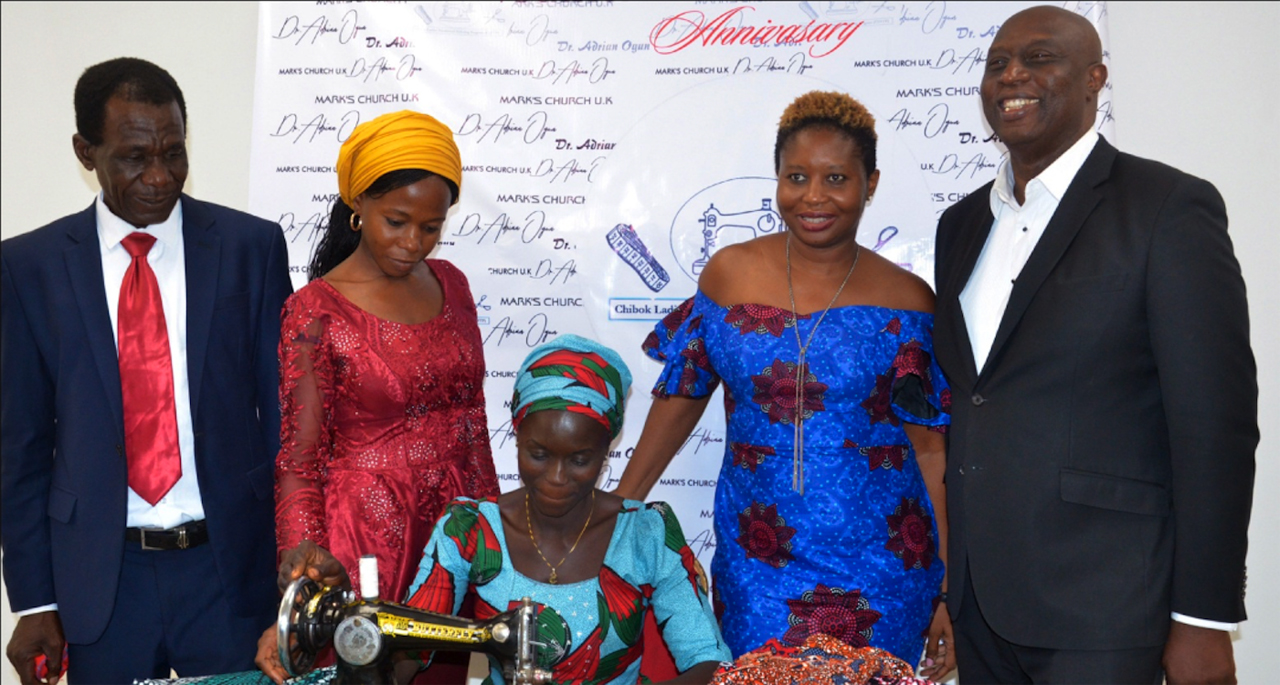
Towards this end, the Chibok Ladies Vocational Tailoring Programme (CLVTP) has been put in place to lessen the socio-economic burdens of some rescued Chibok girls. Speaking during the graduation of five beneficiaries of the programme in Abuja, Dr Ogun explained that the platform was designed to give skill acquisition in tailoring to some of the girls.
He disclosed that the project was being supervised by the chairman of the Abducted Chibok Girls Parents Association (ACGPA), Yakubu Nkeki. “So far,” he noted, “two batches of 24 trainees have graduated from the programme. Four facilitators were engaged for the training in their different workshops within the Chibok community, Borno State.”
Penultimate Saturday, Nkeki led five of the graduate trainees and one of the facilitators, Mrs. Rahilla James, accompanied with sewing machines and samples of clothes sewn to Abuja on the invitation of Ogun. The team commended Ogun, who is a chartered accountant from the London School of Economics and Abuja real estate developer, for giving them joy and hope.
Nkeki said efforts by the Federal Government at rehabilitating the girls failed because of certain factors, including nonchalant handling of the affairs by Ministry officials and lack of interest.
His words: “The Federal Government sent some of the girls to American University, Yola, but due to individual differences, some of the girls refused to stay in school, because just as some preferred to get married, some preferred hand work.
“And for the purpose of those that preferred hand work, I contacted the Minister for Women Affairs to whom the President handed me over to facilitate training for these girls, but the effort proved abortive.
“So, these girls were sitting idly at home until Dr. Ogun came and indicated interest to have the girls get involved in skill acquisition so that they will have something to do after their marriage. That is where we are now.”
According to Nkeki, 24 of the girls, some of whom are now married, have undergone six months training and have been well-equipped to stand on their own.
Earlier, one of the beneficiaries, Mary Dauda, who spoke on behalf of the others, thanked Dr. Ogun for the impact he has made on their lives, stressing: “We really enjoyed the training, which lasted six months.”
While expressing appreciation to the family that trained them, Mary noted with glee that she and her colleagues “are now professional tailors.” She disclosed that they have been sowing different styles on a commercial basis for people in Chibok and making a good living to cater for themselves and their junior ones.
In his response, Dr. Ogun said he just did what he did on behalf of his church, the Saint Mark Church, United Kingdom. He said he was encouraged by his wife to provide means of livelihood to the girls who seemed to have been rejected and neglected by society, because of the humiliation they experienced at the hands of their abductors.
Dr. Ogun maintained that rehabilitating the girls by giving them a source of livelihood and income is the best that could have happened to them in the situation they found themselves in. He promised to address the challenges of the inadequacy of equipment being experienced by the facilitators so as to hasten the training programme and be able to accommodate more beneficiaries.



